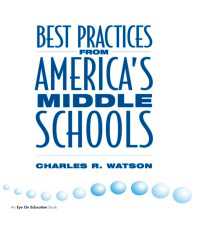Description
Educational practices have rapidly changed in the last few decades, especially in how exchanges of information and learning are delivered and processed. Yet, while the field of international comparative studies has grown, there has not been an extensive study on the relationship between educational practices, students, and how practitioners are prepared and trained. This handbook explores international educational practices and behaviours through new research and a review of existing research, with chapters spread across six parts:
Part I: Introduction to Research Practices in Comparative Studies of Education
Part II: Research Methods
Part III: Policy Transfer Research through International Comparisons
Part IV: Use of Student time in Formal and Informal Settings
Part V: School Practices from Early Childhood through Secondary School
Part VI: Conclusion - Lessons from Large Scale Studies
Table of Contents
Preface - Larry E. Suter
Methods and Practice in Comparative Education Research: Models, Ontologies and Epistemologies - Larry E. Suter, Emma Smith and Brian Denman
Part 1: The Status of Comparative Education Research
Chapter 1: The Status of Comparative Education Research in the 21st Century: An Empiricists View - Larry E. Suter
Chapter 2: Critical Challenges in Approaches and Experience in Comparative Education Research - Brian D. Denman
Chapter 3: Enduring Issues in Education: Comparative Perspectives - Wing On Lee
Chapter 4: Riddled with Gaping Wounds: A Methodological Critique of Comparative and International Studies in Education: Views of a Professor - Rui Yang
Part 2: Measurement Methods in Comparative Education Research
Chapter 5: Challenges in International Large-Scale Educational Surveys - Fons J. R. van de Vijver, Nina Jude, Susanne Kuger
Chapter 6: Non-Cognitive Attributes: Measurement and Meaning - Mary Ainley and John Ainley
Chapter 7: Methodological Challenges to Measuring Heterogeneous Populations Internationally - Leslie Rutkowski and David Rutkowski
Chapter 8: The Participation of Latin American Countries in International Assessments: Assessment Capacity, Validity, and Fairness - Guirimo Solano-Flores
Chapter 9: Validity Issues in Qualitative and Quantitative Research of Cross-National Studies - Jae Park
Chapter 10: Mixed Methods in Education: Visualising the Quality of Quantitative Data - David A. Turner
Part 3: Research Practices in Comparative Studies of Education
Chapter 11: Growth and Development of Large-scale International Comparative Studies and their Influence on Comparative Education Thinking - Larry E. Suter
Chapter 12: The Meaning of Motivation to Learn in Cross-National Comparisons: A Review of Recent International Research on Ability, Self-concept, and Interest - Ming-Te Wang, Jessica L. Degol, Jiesi Guo
Chapter 13: Examining Change over Time in International Large-Scale Assessments: Lessons Learned from PISA - Christine Salzer and Manfred Prenzel
Chapter 14: Qualitative Comparative Education Research: Perennial Issues, New Approaches and Good Practice - Michele Schweisfurth
Chapter 15: Methodological Challenges in Conducting International Research on Teaching Quality Using Standardized Observations - Anna-Katharina Praetorius, Wida Rogh, Courtney Bell and Eckhard Klieme
Chapter 16: The Measurement and Use of Socioeconomic Status in Educational Research - J. Douglas Willlms & Lucia Tramonte
Part 4: Lessons from International Comparisons of Student Behaviors
Chapter 17: Early Childhood Care and Education in the Era of Sustainable Development: Balancing Local and Global Priorities - Abbie Raikes, Dawn Davis and Anna Burton
Chapter 18: Equity of Access to Pre-Primary Education and Long-Term Benefits: A Cross- Country Analysis - Gerard Ferrer-Esteban, Larry Suter and Monica Mincu
Chapter 19: Primary Education Curricula across the World: Qualitative and Quantitative Methodology in International Comparison - Dominic Wyse & Jacob Anders
Chapter 20: Outside-School-Time Activities and Shadow Education - Siyuan Feng & Mark Bray
Chapter 21: Measuring Opportunity: Two Perspectives on the “Black Box” of School Learning - Leland S. Cogan and William H. Schmidt
Chapter 22: What Can International Comparative Tests Tell Us about the Future Supply of Highly Skilled STEM Workers? - Larry E. Suter and Emma Smith
Part 5: International comparisons of Instruction
Chapter 23: Comparative Research on Teacher Learning Communities in a Global Context - Motoko Akiba, Cassandra Howard and Guodong Liang
Chapter 24: Teaching Instructional Practices: Play-Based Learning – Supporting the Transition from Early Years to Primary Education - Tanya Hathaway
Chapter 25: Challenges in Practice: A Critical Examination of Efforts to Link Teacher Practices and Student Achievement - Laura O’Dwyer and Catherine Paolucci
Chapter 26: Global Higher Education Trends: Implications for Policy and Practice - Christopher C. Blakesley, Donna J. Menke and W. James Jacob
Chapter 27: Digital Technologies and Educational Transformation - Nancy Law and Leming Liang
Chapter 28: International Large-scale Student Assessments and Their Impact on National School Reforms - Gustavo E. Fischman, Pasi Sahlberg, Iveta Silova and Amelia Marcetti Topper
Part 6: Influence of Large-Scale Assessments on Policy
Chapter 29: Changes in the World-wide Distribution of Large-Scale International Assessments - Larry E. Suter
Chapter 30: The Uneasy Relation Between International Testing and Comparative Education Research - Martin Carnoy
Chapter 31:Global and Local Dissonance when Comparing Nation-States and Educational Performance - Colin Power
Chapter 32: Building Learning Assessment Systems in Latin America and the Caribbean - Adriana Viteri and Pablo Zoido








